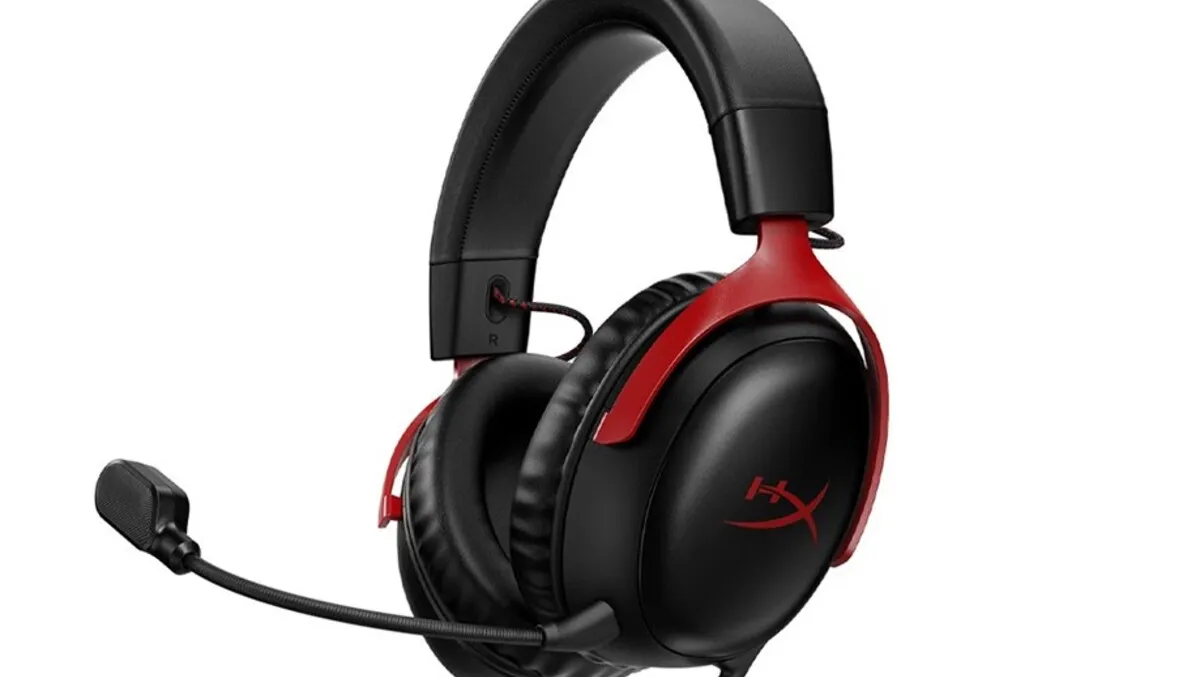
Hands-on review: HyperX Cloud III Wired Gaming Headset
The HyperX Cloud III is a stylish upgrade to the well-received Cloud II headset. It's a wired headset designed for use as an audio solution for all your devices, be it a PC, gaming console, or mobile phone.
With a proper pleather-covered memory foam adjustable headband, the headset feels robust and well-made. The dangly wires from the headband to the ear cups are a bit different but help facilitate the very nice thin red steel hinges for the earcups. It's a striking design that sets the headset apart from the rest.
There is a little bit of horizontal twist in the earcups, but they don't lay flat. It's just enough to assist in putting them on. The earcups do twist on the vertical axis to ensure they fit nicely no matter what sized head you have. The metal earcup mounts extend quite a bit for those with large noggins.
The pleather memory foam earcup cushions are very comfortable, sealing in your ears. The pressure from the headband is quite light, enough for a comfy fit without pressing too much on your head.
The cable from the headset to the 3.5mm audio jack is 1.25m long, with another 1.25m long extension cable with both USB Type-C and an adapter for USB Type-A connections. The 3.5mm audio jack can be plugged straight into an Xbox controller.
The flexible boom mike is detectable, allowing the headset to be used as a regular pair of headphones for listening to music on your phone. The controls are kept simple, with a mute button on the left earcup (the side with the mic) and an easy-to-find volume dial on the right earcup.
As with all HyperX products, the headset utilises the HyperX Ngenuity desktop application for PC use. This enables the DTS X Spacial Sound, mic monitoring (sidetone), and 10-band equalizer settings. There are no equalizer presets for music, movies, or games, which was unusual. Instead, I had to set up my own, which was no real hardship.
To use the Ngenuity application, PC users must connect the headset directly to a USB Type-A or Type-C port on their machine via the included USB adapter cable. If you have an external soundcard like an EPOS GXS 1000, the headset can be plugged in and used via the 3.5mm jack. The headset can also be connected to a PC case via a headphone socket to use an onboard or internal soundcard using the 3.5mm jack.
As mentioned, the headset works with Xbox consoles by plugging the 3.5mm jack into an Xbox controller. This allows the headset to provide no-nonsense audio for Xbox gamers. PlayStation owners can enjoy the headset via USB or by connecting the headset directly to the controller. Similarly, the headset can also be used with the Nintendo Switch and mobile phones via USB Type-C or the 3.5mm jack. However, if you are using the USB adapter, the cable does end up 2.5m long, which is quite the length when using it with a mobile device.
The audio is crisp even without fine-tuning via the PC app; this means no matter what device you are using it with, you are going to be able to enjoy great sound. I like my games and music loud, so I'm pleased to say that I could turn the volume up on the Cloud III to an almost ear-damaging level and still not detect any significant distortion.
The microphone is touted as being noise-cancelling. Whilst not quite the same quality as my HyperX Quadcast mic, I found it good enough to pick up audio for my videos in Adobe Audition. It certainly works well enough for in-game chat.
The HyperX Cloud III gaming headset is pleasantly simplistic, comfortable, and easy to use but also stylish and robust. Its versatile design makes it suitable for use across all your devices. Though the DTS X functionality is reserved for PC users, the sound is still crisp and clear no matter what device it is used with. As with other HyperX headsets, the Cloud III, whilst relatively inexpensive, sacrifices nothing, offering performance on par with headsets twice the price.


